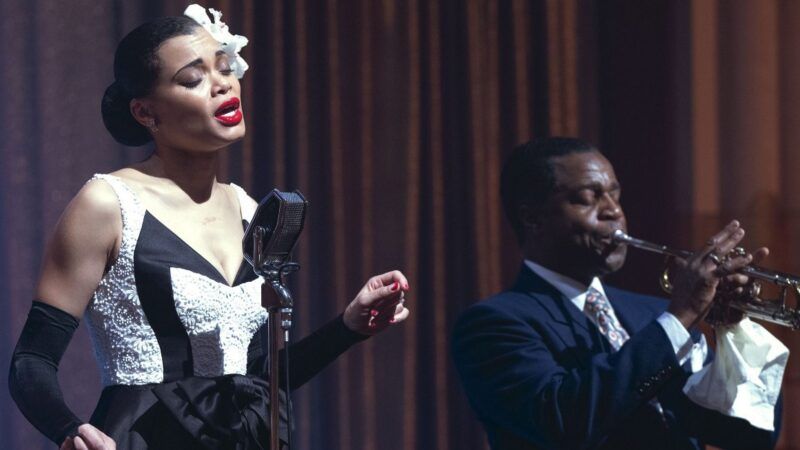Andra Day Shines in a Confused Interpretation of The United States vs. Billie Holiday
What we know about Holiday’s mistreatment is compelling enough without muddling her history.

- The United States vs. Billie Holiday. Available now on Hulu.
- Bulletproof: South Africa. The CW. Monday, March 15, 8 p.m.
The jazz singer Billie Holiday, once asked about a claim made in her autobiography Lady Sings the Blues, just shrugged. "I never read that book," she declared. That's a useful thing to remember anytime you're trying to learn anything about Holiday.
Born in a raggedy ghetto, raised in large part in a whorehouse, and leading the tawdry existence of a sexually abused junkie through the better part of her 44-year life, practically nothing about Holiday—except, of course, her magnificent voice—is very well-documented or even documented at all. And the mystery won't be changing based on the premise of the film The United States vs. Billie Holiday: that the federal government hounded her for a decade and then into her grave to stop her from singing her powerful anti-lynching protest ballad "Strange Fruit."
There's no doubt about the hounding part of that sentence: Federal drug cops repeatedly arrested Holiday and gave her dealer-level jail sentences for possession of small amounts of heroin. There's no doubt Harry Anslinger, the head of the Federal Bureau of Narcotics (the ancestor of the Drug Enforcement Administration), was a demented racist. (His rationale for the war on drugs that he helped launch—and name—in 1930: "Reefer makes darkies think they're as good as white men.") And there's no doubt he despised jazz, in which "unbelievably ancient indecent rites of the East Indies are resurrected," he said, as well as anybody who played or sang it.
But the part about Anslinger's rage over "Strange Fruit?" There's no actual evidence for it. And it doesn't seem likely. Billie Holiday portrays Anslinger as declaring war on Holiday in 1947. That's a full eight years after she recorded the song. Stopping her from performing "Strange Fruit" would have done nothing to remove the record from thousands of jukeboxes in black juke joints around the South. Nor, for that matter, would silencing the song have helped Southern racists preserve their sacred institution of lynching, which, by then, had nearly disappeared.
Why director Lee Daniels (Empire, Star) and screenwriter Suzan-Lori Parks (who won a Pulitzer for her play Topdog/Underdog) elected to base their film—which is debuting on Hulu because COVID has denied it a theatrical release—is abundantly unclear. The tale of Holiday's persecution would be just as infuriating and heart-rending (she died of cirrhosis of the liver while under arrest in a hospital bed, charged with possession of a token amount of heroin) if it had been told truly.
But that's not the only confusion swirling around Billie Holiday. Characters, some fictionalized and some not, appear and disappear like ghosts with an overbooked schedule of houses to haunt. The show's junkie-bleak look turns abruptly lush when a mostly imaginary romance (with a federal narcotics agent!) pops briefly up, then goes noir again when Holiday throws him over. And any real sympathy for Holiday is squandered by starting the film in 1947, when her life was already well into its downhill slide. Her brilliant 1930s ascension to stardom from an appalling childhood would have been a better story in every way.
What we're left with is a convincingly hardball performance by British singer Andra Day in her first big acting role as Holiday. (Coincidentally, Diana Ross won an Oscar as Holiday in her first big acting role in Lady Sings the Blues, an even more unlikely 1972 recounting of Holiday's life.) As an actress, Day mostly smolders—not inappropriately, given the script—but as a vocalist she runs the gamut from playful to anguished as she performs the Holiday songbook. She brilliantly invokes the smoky and slightly fractured tone of Day's singing without ever falling into an imitation. If only the rest of Billie Holiday could have lived up to her.
Speaking of the falsification of history, I seriously doubt if today's South Africa is the pastoral portrait of post-racialism on display in The CW's Bulletproof: South Africa, but that's part of the fun. Probably because it's British-made and not subject to the pressure to prove its producers believe with all their hearts that black lives matter, Bulletproof features two black English cops operating half a world outside their jurisdiction in what until recently was the global poster boy for white supremacist rule—and nary even a tiny racial theme in sight. The jokes and the lead fly; the social-justice recriminations do not. At a moment when practically every episode of every show on American TV is relentlessly Meaningful, it's a blessing.
The three episodes of Bulletproof that The CW is showing actually comprise the entire third season of Bulletproof, which aired on the British Sky One network earlier this year. A bromantic cop show with a distinct whiff of the Lethal Weapon movies, Bulletproof stars British TV actors Ashley Walters and Noel Clarke as Pike and Bishop, a pair of rough-and-tumble London cops born into the wrong century; when they aren't beating the holy crap out of suspects, they're running them over with cars. Even their stabs at social work tend to the rugged, as when Bishop, sent to talk a suicide jumper down from a high-rise building, pushes him off the roof instead. Turns out a safety net has been unfurled down below. But, still.
Their antics have them perpetually in trouble in London. But when they go on vacation to Cape Town, things get really bonkers. When the young daughter of a South African couple they've befriended at the beach is kidnapped, Pike and Bishop don't need no stinkin' jurisdiction, they go right into action, blowing up cars, breaking into homes and shooting up suspects with joyous abandon. "Start playing by the rules," a local cop warns. "This is not London." Cry the beloved county, bro.


Show Comments (21)